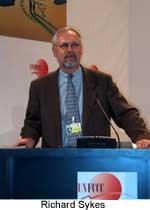
COP7 - Marrakech, Morocco
High Level Ministerial Plenary Session, 8 November 2001
Intervention by: Richard Sykes
World Business Council for Sustainable Development.
Mr President, Honourable Ministers, Distinguished Delegates, Ladies and Gentlemen,
My name is Richard Sykes, speaking on behalf of the World Business Council for Sustainable Development.
 The WBCSD business case for climate change action emphasizes the role of markets because sustainable development is best achieved through markets that are fair, competitive, open, and global. Such markets encourage innovation and eco-efficiency, both of which are essential for sustainable human progress. Increasingly, markets must capitalize on new partnerships between business and others, providing consumer choice as they do so. The WBCSD business case for climate change action emphasizes the role of markets because sustainable development is best achieved through markets that are fair, competitive, open, and global. Such markets encourage innovation and eco-efficiency, both of which are essential for sustainable human progress. Increasingly, markets must capitalize on new partnerships between business and others, providing consumer choice as they do so.
The Kyoto Protocol contains the seeds of such a framework that can, and should, be built upon. WBCSD sees the following as essential elements of a long-term climate change framework.
1. One global system
We should strive to avoid differing sets of rules among the Kyoto parties. We must also work to bring the larger family of nations into active management of greenhouse gases.
2. Minimizing bureaucracy
Business and industry have the key skills and resources to make progress in reducing greenhouse gas emissions and provide more energy-efficient consumer products. The mechanisms to encourage such initiatives must be efficient and function with low transaction costs.
3. Incentives for early action and implementation
Proactive action by industry in emissions reduction, sequestration and innovation in technology should be systematically rewarded to enlist the broadest possible effort.
4. Business as a solution provider
Business has a responsibility to assume leadership and demonstrate progress toward the goal of sustainable development. The WBCSD will encourage companies to make case descriptions of their climate change work available, to report on greenhouse gas emissions, and to share their commitments.
For business to succeed in its role as a solution provider, overly prescriptive control mechanisms must not inhibit practical actions and learning by doing.
I would also like to make reference to the role of business at the World Summit for Sustainable Development. The summit will address significant challenges. After several years of protests against capitalism and globalisation, many industrialists are aware of the accusation that their activities exacerbate social problems and environmental degradation.
Yet many businesses are convinced that they play a valuable part in sustainable development - and are eager to play a constructive role in Johannesburg .
This issue is being addressed by Business Action for Sustainable Development, an ad-hoc initiative drawn together to represent business at the Summit. Set up by WBCSD and the International Chamber of Commerce, it is being led by Sir Mark Moody-Stuart, former chairman of the Royal Dutch/Shell Group.
The initiative has three main goals:
- it aims to ensure that the voice of business is fully taken into account in the preparations for the conference
- it wants to identify concrete areas for action where business can play a constructive role and
- it wants to demonstrate that business is already actively engaged in a host of initiatives or partnerships to promote sustainable development.
There is scope for a useful dialogue with NGOs. The vast majority are fundamentally constructive and want to contribute. It is now clear that a lot of people in the anti-globalisation movement are keen to discuss the rules and frameworks governing trade and other issues.
Working together with NGOs and governments we can map out ways forward that are objective and realistic. Business intends to play a full and constructive role in the preparation of the Summit, and Sir Mark is actively engaged with the UN Secretariat and the South African organisers, to help ensure a successful outcome.
|

